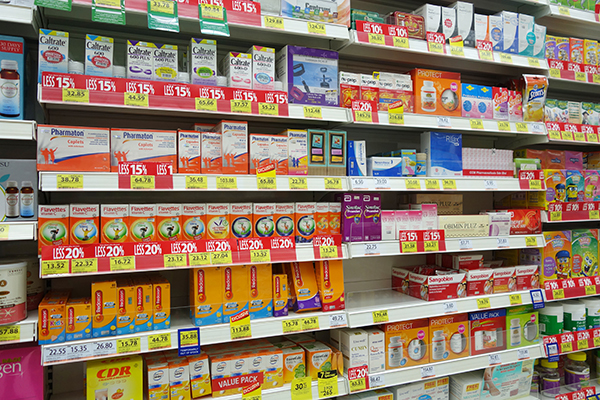OTC drugs, also known as over-the-counter drugs, are medications that you can legally purchase without a prescription. Most people have a wide array of OTC drugs in their medicine cabinets at home, which house everything from cough syrup to acetaminophen and other low-grade pain relievers. OTC medications are not federally regulated, meaning that anyone can sell them. In addition, while accessible, they are frequently abused by adolescents and young adults who don’t have access to other chemical substances. Which over-the-counter medications are abused the most frequently, and what steps can you take to ensure that your child isn’t abusing OTC drugs? 
Commonly Abused OTC Drugs
One of the most commonly abused OTC medications is a cough syrup that contains dextromethorphan. In some cases, this type of cough syrup is mixed with a soda or an alcoholic beverage and called “lean.” Antihistamines, or allergy medicines, are also commonly abused. These medications tend to cause drowsiness. Sometimes, adolescents take them in large quantities to produce intense drowsiness that feels somewhat similar to a “high” caused by an opioid narcotic or a different depressant drug. However, taking OTC medications in higher-than-recommended doses can lead to a host of serious health-related complications.
More About Commonly Abused Over-The-Counter Drugs
There are many drugs that you can get over the counter (OTC) that you can mix with other ones and make them far worse than they would be just alone. Luckily some places are locking their cough syrup up and are asking for ID to buy the cough syrup, but there are still are plenty of other over-the-counter drugs out there that are being abused. It is important to know the signs and symptoms of someone who is abusing over-the-counter drugs. What are some of the most abused over-the-counter drugs? According to an article published by the US National Library of Medicine:
“Multiple OTC medications have abuse potential. Commonly abused medications include antihistamines, sleep aids, caffeine, ephedrine, pseudoephedrine, antitussives and expectorants, dextromethorphan, laxatives, anabolic steroids, and sildenafil. Laxatives are abused for weight loss and high antihistamines doses are used for euphoria. From the studies done across the world for OTC medication abuse, opiate-based combination products and cough/cold products containing dextromethorphan, sleep aids, antihistamines, analgesic, hypnotics, and laxatives have been highlighted as having abuse potential.” (NLM)
Is Your Child Abusing OTC Drugs?
How can you tell whether or not your child is abusing over-the-counter medications? Keep an eye out for the following warning signs – and feel free to call Evoke Wellness with any additional questions you may have. We are more than happy to answer any questions and help you find treatment for your loved one.
- Your child has been raiding your medicine cabinets, and you frequently notice that certain medications are missing.
- Your child has been purchasing OTC medication from a peer.
- Your child has been acting differently; they might be sleeping strange hours, eating more or eating less, or spending time with a different group of people.
- Your child has experienced a decline in their grades or is getting into trouble with teachers and other authoritative figures more frequently.
Evoke Wellness and Age-Specific Treatment Options
At Evoke Wellness, we offer age-specific treatment options for adolescents, young adults, older adults, and elderly individuals. Regardless of age, addiction can strike anyone; however, if your child has abused OTC drugs or any other chemical substances, you must help them participate in a successful addiction recovery program as soon as possible. Even OTC medications can be habit-forming. If your child is stealing medications or purchasing them from a friend or acquaintance, it is a good indication of a substance abuse disorder in its early stages. To learn more about our comprehensive drug addiction recovery program, simply give us a call or contact us directly through our website.


